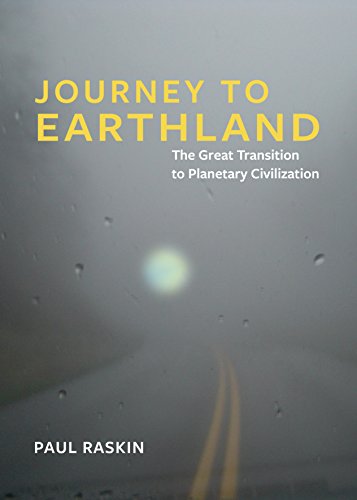Journey to Earthland: The Great Transition to Planetary Civilization by Paul Raskin
Paul Raskin is the founding president of the Tellus Institute, a Boston “think tank” that began an initiative called The Great Transition in 2002. That initiative is a vision of how an ecologically threatened world could transition to a sustainable economy. This book has been out almost two years, and it points up a transition in thinking from what technically could be, to how global culture needs to transform in order to make it so.
Other recent environmental books nudge in that direction. Paul Hawkins’ Drawdown lists about 100 alternatives that people can pursue now, urging us to get on with them. Margaret Wheatley’s latest is on leadership for a turbulent future. Raskin’s book is a letter from the future explaining how cultural change came about.
Raskin advocates a global movement to make people think of themselves as citizens of the world first, rather than of national government, local communities, or tribes. That’s a quest for a better form of civilization. Being academic, Raskin gives this a catchy Latin name, civita humana. His motivation for becoming a citizen of the whole word is “modernize or barbarize.”
The heart of this change is a shift in fundamental values; from high consumption to enough-is-enough; from wealth as a marker of status to fulfillment of life; from seeking to dominate nature to realizing our dependence on it; from bigger is better to small is beautiful. Not the least of these issues is the social will to stabilize the size of human populations and substantial rights for women.
Needed would be a form of global governance that Raskin calls “constrained pluralism,” organized according to the scope of problems. A few problems can’t be reduced from global scope (satellites in space is one). However, the needs of regions and localities vary so much that they are best addressed at that level.
Raskin advocates decentralizing population centers too, draining huge metropolises into smaller towns, centered on food supplies. New social contracts would provide for the care of children, the elderly, and the needy. And Raskin thinks that most of us would have more free time – to use imaginatively, hopefully.
Raskin worked a few current social proposals into his journey: public banks, guaranteed incomes, and benefit corporations (B-Corps). Business has to shove the priority of profit down the line, behind the objectives of public and environmental service.
Everyone concerned about our planetary future, including the Compression Institute, is evolving in a similar direction. A huge advance in human civil capability is necessary. No one’s vision has yet gone viral because all ideas are too radical a departure from current living. Everybody knows that, but the differences in explanation are revealing.
Raskin, a PhD physicist by training, has an academic style that would put off readers not into “intellectual pursuits.” His style contrasts with William T. Vollmann, who is not technical, but is struggling with his recent cognizance of approaching environmental disaster. He explains our predicament through the words of ordinary people on the street, also reviewed in this issue.

